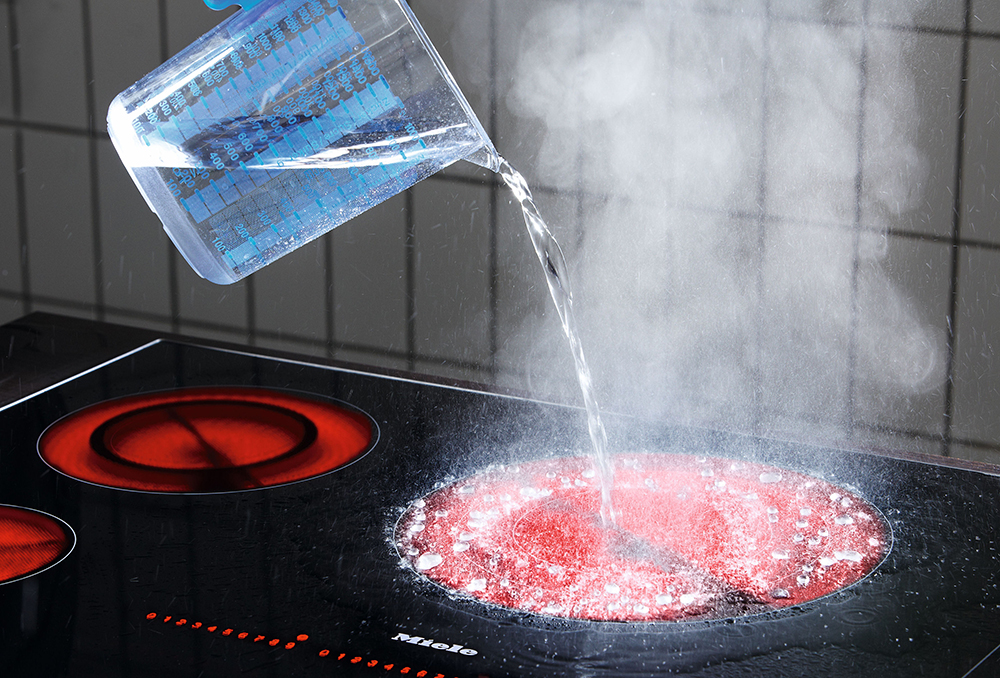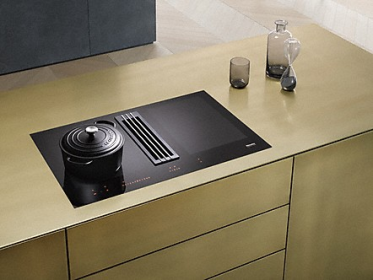
The kitchens at the Arthur Apartments in Melbourne come complete with Miele appliances as a sign of quality.
Let’s face it – when you install an appliance the last thing you want to be thinking about is how to take it out – and with this in mind, investing in quality becomes key.
Regardless of its use, any appliance worth its price tag needs to undergo serious testing. Be it a toaster or a vacuum cleaner, you want to know it will go the distance and any decent manufacturer will have robotic testing centres in place to replicate the usage of their product over a desired life-expectancy.

Robotic testing of dishwasher movements simulate the 20 year life-expectancy of the products.
Imagine it, a fire-proof vault created specifically to test the burning point of your sandwich maker or automated machines created to check the number of times you can turn slices of bread into toast. These things are real and important, like testing the distance a vacuum can keep suction or the thousands of times you will pull out the dishwasher baskets.
Some appliance manufacturers also test their products in real life scenarios – that is, in people’s homes – which gives the designers and engineers an insight into how they will actually be used. It is part of the research and development phase that is crucial in ensuring a product will work for its intended audience.

Testing of appliances doesn't just involve robots, it considers real life accidents and the endurance of materials.
For companies like Miele, the R&D phase can take up to five years but results in products which are designed for a useful life of 20 years under average household use. For that reason, design becomes important – what is on trend today may not be so appealing in ten years time so it is worth taking a timeless approach when selecting in-built appliances.
It is also worthwhile looking at international design awards like Red Dot or the Australian Good Design Awards to see where your money will be best spent. These awards programs involve stringent testing of each entry by juries of industry leaders and award innovation in design over aesthetics.
The provision of a good after-sales service backup is also a good sign that a manufacturer believes in their product. So too is access to original spare parts. Nothing is more frustrating than finding out you can no longer get that part for your car and it is the same with appliances, so it is wise to enquire about a manufacturer's ongoing production of spares.

Each Miele washing machine is hand tested to ensure there are no sharp edges that will damage fabrics.
Materials too are something to look out for, and not just the ones you can see. High grade stainless steel is as valuable in washer dryers as it is in a coffee machine. The working parts of any appliance are the most important and spending a bit more on quality will mean less maintenance and a longer product life.
Jane Wilson, a psychologist from Sandy Bay in Hobart, owned her Miele washing machine for almost 40 years before it had to be replaced.
Even things like the counter weight in a washing machine come into the equation, and typically you will find they are concrete. Over time concrete may become brittle and degrade – not ideal when it is the thing keeping your appliance steady. In this instance cast iron is a better choice, and in considering the end-of-life cycle for their appliances, Miele have set up a pilot program in Europe where old washing machines are dismantled and high quality metals are converted into new counter weights and other components.
These aspects come together to give us faith that our appliances will last, and is the reason Melbourne developer Hallmarc pre-installed Miele fridge/freezers and dishwashers in the 90-plus apartments of their recent Arthur Apartments building.
_
HOUSELAB HINTS
KEY CONSIDERATIONS WHEN CHOOSING AN APPLIANCE
Ultimately, we want our appliances to last as long as they can. It’s better for us and better for the environment so here are a few tips on what to keep an eye out for:
- Look for good after-sales service backup, that tells you the manufacturer has faith in the product and there is less chance of something becoming landfill.
- Avoid composite materials as they are harder to recycle.
- Ask if the manufacturer produces spare parts and for how long (as an example Miele keeps spares for up to 15 years after a product has been discontinued).
- If a company owns its own factories then you can have faith they are keeping an eye on quality.
- Research products through respected design awards such as Red Dot and the Good Design Awards.
- Don’t follow trends but invest in new innovations with a timeless aesthetic.
WRITTEN BY HouseLab









